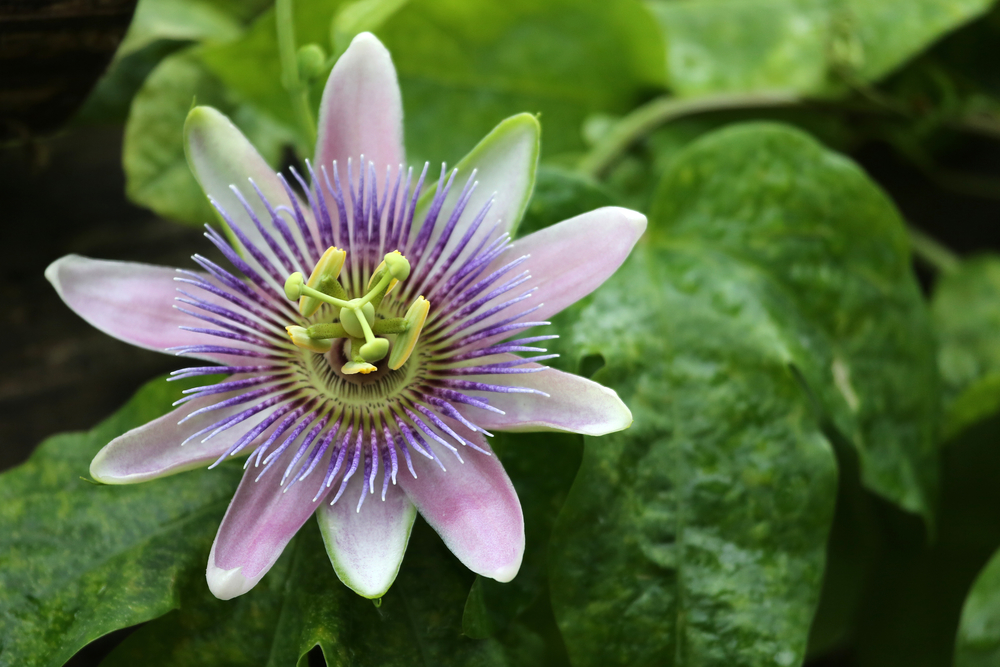 By: D. L. Flarey, Ph.D, RN, ANP-BC
By: D. L. Flarey, Ph.D, RN, ANP-BC
Passionflower is mostly known for its calming qualities; it has an extensive history of use in calming those who are stressed and nervous. Passion flower was used by Native Americans for its sedative qualities, and was used in Europe as early as the 16th century for its ability to support a calm, positive state of mind. Current analysis has confirmed these practices, indicating passionflower’s calmative quality is due to a flavonoid called chrysin. Chrysin is thought to help regulate GABA (gamma-aminobutyric acid), a neurotransmitter in the brain and nervous system that manages nerve excitability. (1)
Passion flower was initially identified by the Spanish while exploring Peru. Its name was derived from the concept that the blossom was a symbol of Christ’s passion and also it was an indication of His favor of their exploration. The different parts of the flower petal are described as expressions pertaining to the passion of Jesus Christ, for instance, the crown of thorns being actually symbolized by the hair like fibers numbering in the hundreds in each petal. (2)
Calming Anxiety
According to the research, passion flower has typically been administered for nervous anxiety, insomnia, pain, restlessness, anger, and hysteria. The ability for passion flower to support these disorders is believed to be the result of the substance benzoflavone, chrysin, and the pyrone derivative maltol. (3)
Chrysin is a monoflavonoid, regarded to be the principal active component made from Passion Flower. In laboratory settings, specialists have demonstrated that Chrysin functions as a partial agonist of the core benzodiazepine receptors in the brain. Although the exact system of action is not precisely understood, it is thought that the blend of Flavonoids in Passion Flower contribute to its efficiency as an anxiolytic, helping to promote relaxation, alleviate stress and ease intermittent anxiety and panic triggered by emotionally charged tension. (4)
Working together, passion flower’s anxiety-soothing, sleep-promoting top qualities join abilities to give you one greatest health benefit in the end: relaxation and peace of mind. When working with different anti-anxiety natural combinations, the plant could very well possibly achieve much more for peace of mind and sleep. (5)
According to European medical data, passion flower is recognized for its effect in treating nervous restlessness, uneasiness, irritability, vegetative dystonia, agitated mind, and sleep disorders. Additionally, investigations have certainly shown improved cognitive focus levels and relief of anxiousness. (6)
Studies on Passion Flower
There actually have been research examinations completed on passion flower going back to the 1930’s which have identified it aids to induce relaxation which brings about a deeper sleep, and almost eradicates sleep loss. Its mechanism of action, however, is actually very distinct than prescription sleep drugs, thus an individual does not need to feel uneasy about an artificially prompted sleep or awakening with a drug-like experience. (2)
Animals administered doses of 150 milligrams per kilogram body weight passed even more time in open, unguarded and elevated areas during the course of a maze experiment. Also, the supplement did not necessarily lead to either a sedative or arousing effect. A report written in the March 2010 “Journal of Ethnopharmacology” found that low doses of passion flower extract reduced anxiety, while higher doses produced a sedative effect. (7)
Passion flower may also work as a mild relaxing natural treatment. The tranquil effect by itself does not typically lead to drowsiness, so it is a particularly beneficial day time tranquilizer. Moderate use supports a feeling of tranquility, without side effects, and without the likelihood of chemical dependency or habit-formation. (6)
People have indeed used passion flower typically to manage stress, and continue to do so today. A study written in the October 2001 issue of the “Journal of Clinical Pharmacy and Therapeutics” identified that passion flower was as beneficial as the pharmaceutical drug oxazepam for managing generalized anxiety disorder. An overview of research studies published in the February 2006 issue of the “British Journal of Psychiatry” reveals passion flower having potential for calmative use in many people with psychological health disorders. (8)
Passion flower typically has been less popular than Valerian Root, however, in a new study of well-known herbal calmatives in Great Britain, passion flower did slightly better than Valerian Root and took the leading honor. Passion flower is taken essentially as a calmative or nervine to combat excess anxiousness and anxiety, to tranquilize, and to induce sleep; as an anodyne, anti-spasmodic and anti-convulsant and to manage dysmenorrhea and muscle cramps. Primarily, passion flower is utilized world-wide as a light calmative that abates anxiety, nervous tension, high blood pressure, and encourages sleep. It has furthermore been utilized as an antispasmodic (or spasmolytic) in the treatment of muscle cramps, seizures, premenstrual tension, and even epilepsy. Passion flower preparations have actually been observed to eliminate nervous symptoms and cramps that restrict sleep, and to produce a tranquil and deep sleep free from constant awakenings and disturbances. The antispasmodic action is even effectively used in the treatment of respiratory asthma. Passion flower is well known for its analgesic or anodyne action. (9)
Even though investigators formerly believed that the alkaloids and flavonoids in passion flower caused its calmative and anxiolytic effect, modern studies suggest that the amino acids in the botanical herb may well be responsible. This is actually because these particular amino acids are able to increase GABA levels in the human body. (10)
Conclusion
Passion flower is generally regarded safe and very well tolerated by many people. There is insufficient data about negative side effects and possible pharmaceutical interactions. Passion flower may possibly interact with various other medications or treatments, so if changes to physical health develop, promptly contact a primary care physician (3) or a certified holistic nurse.
